On July 14, 2022, the last meeting of the regional parliament in the spring session took place. Deputies adopted laws to increase revenues and expenditures of the regional budget, to provide tax benefits to cinemas, educational organizations, as well as entrepreneurs using a simplified or patent tax system. Wood harvesting standards have been optimized, bills regulating property management in the Omsk region, job quotas, and others have been accepted for consideration. Concluding the meeting, Chairman of the Legislative Assembly of the Omsk Region Vladimir Varnavsky summed up the work of the parliament.
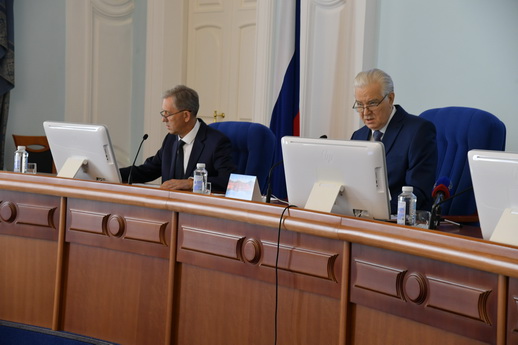
Among the first issues on the agenda of the meeting are parliamentarians
discussed the revised project
Law "On Amendments to the Charter (Basic Law) of the Omsk Region",
developed in accordance with Federal Law of December 21, 2021 No.
414-FZ "On the general principles of the organization of public power in the subjects
Russian Federation", and decided to adopt it in the first reading. The bill
taking into account the constitutional foundations of the unity of public power and general principles,
provided for by the said federal law, it is proposed to change certain
provisions of the Charter (Basic Law) of the Omsk region relating to the organization and
activities of government bodies of the Omsk region and other
state bodies of the Omsk region that are part of the unified system of public
authorities in the Omsk region.
Then the whole package was examined in first reading mode
bills. In particular, the draft law “On Amendments to Article 6.2 of the Law of the Omsk Region
"On combating corruption in the Omsk region", which in
In the end, it was decided to adopt it in the first and second readings.
The law establishes that the procedure for adoption
decisions on application to a deputy, member of an elected body of a local
self-government, elected official of local government,
who provided false information about income, expenses, property and
obligations of a property nature, liability measures provided for
part 7.3-1 of article 40 of Federal Law No. 131-FZ, is determined by regulatory
legal act of the representative body of the municipal formation of Omsk
areas.
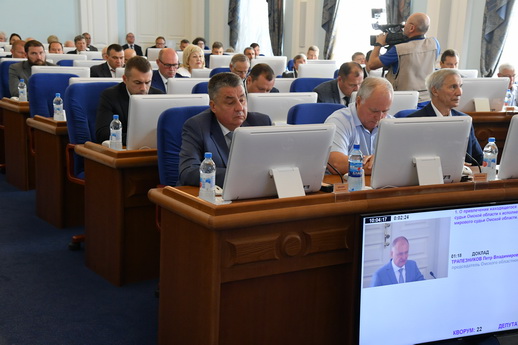
Also considered and adopted in the first and second readings
laws "On amendments
in Article 5 of the Law of the Omsk Region "On the regulation of forest relations in the Omsk
region", "On amendments to certain laws of Omsk
region" and others. The first of
the content of these laws is aimed at optimizing procurement standards
wood for heating residential premises.
Thus, it has been established that for
heating of residential premises with other types of heating other than stove
heating located in Znamensky, Tarsky, Tevrizsky districts of Omsk
region, owner (tenant), one of the owners (tenants)
premises that have not previously harvested wood for residential heating
premises due to the interruption of natural gas supply due to a decrease in
wellhead pressure of gas production wells of the Tevriz gas condensate field
deposits, timber harvesting will be carried out within 30
cubic meters in order to create a wood reserve in case of possible termination
natural gas supply.
In addition, the law establishes the following procurement standards
wood for heating residential premises due to interruption of supply
natural gas in subsequent heating periods: 10 cubic meters
wood, if the period of interruption of natural gas supply was less than 90
calendar days (consecutive or cumulative) during the previous heating season
period, regardless of the actual start and end dates of the previous
heating season; 30 cubic
meters of wood if the natural gas supply was cut off within 90
calendar days or more (consecutive or cumulative) during the previous
heating period, regardless of the actual start and end dates
previous heating period.
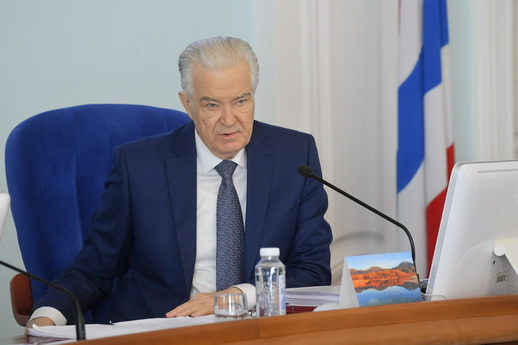
< br>
During its discussion, questions were raised not only on specific
provisions of the document, but also in general regarding timber harvesting. "This law is
compromise,” noted the speaker of parliament. – It was discussed in detail with deputies,
with factions." At the same time, Vladimir Varnavsky focused the attention of those gathered
on three topical issues requiring prompt and thoughtful solutions: updating
forest management documents, decision
problems with the so-called “white forest” and the creation of cooperatives for
timber harvesting.
The second of the above laws is “On
amendments to certain laws of the Omsk region" - makes changes to the regional
the law on property tax of organizations and
the law on certain issues of establishing a tax rate of 0
interest for individual entrepreneurs using the simplified system
taxation and (or) patent taxation system.
In accordance with it, exemption from
payment of tax for 2022 in the amount of 50% of the established tax rate
organizations carrying out economic activities in the Omsk region
activity "Activities in the field of demonstration of films" - in
in relation to real estate intended and used for
carrying out activities in the field of demonstrating films.

< br>
Educational institutions are exempt from property taxes
organizations implementing
in the current tax period, primary general educational programs,
basic general, secondary general education, - in relation to property,
put into operation no earlier than January 1, 2014, including after
reconstruction intended and used by these organizations for
implementation of educational programs of primary general, basic general,
secondary general education.
Also from paying property taxes in 2022
organizations that carry out activities in the Omsk region are exempted
production of beer and beer-based drinks, which have a share
income from activities related to the production of beer and beverages,
manufactured on the basis of beer, based on the results of the corresponding tax period
was at least 70 percent. Condition for granting tax benefits
is to ensure beer producers increase excise tax revenues on beer in
2022 compared to 2021.
It is assumed that the specified measure of state support
will allow maintaining brewing production in the Omsk region and,
therefore, provide jobs and a further increase in excise taxes on beer.

The validity period in the Omsk region is extended by one year
region of the Omsk Region Law of July 16, 2015 No. 1768-03 “On individual
issues of establishing a tax rate of 0 percent for individual
entrepreneurs using a simplified taxation system and (or)
patent taxation system" in connection with the adoption of the Federal Law
dated March 26, 2022 No. 67-FZ "On amendments to part one and
second of the Tax Code of the Russian Federation and article 2 of the Federal Law
"On amendments to part two of the Tax Code of the Russian Federation
Federation".
"Introduction of the right to apply" tax
vacation" is aimed at stimulating citizens to engage in
entrepreneurial activity, as well as the involvement of individuals in the economy
persons currently engaged in informal business
activities without the involvement of hired workers,” it is said in
explanatory note to the document.
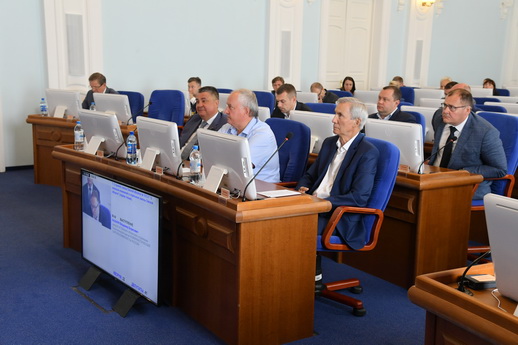
The laws “On Amendments to the Law” were adopted in all readings.
Law of the Omsk region "On the regional budget for 2022 and for the planned
period 2023 and 2024", "About
execution of the regional budget for 2021", presented by the Ministry
finance of the Omsk region. The first of these laws provides for
in particular, an increase in revenues and expenses of the regional budget for 2022.
“Revenues increase by more than 1.5 billion rubles,”
said Vladimir Varnavsky. – Taking into account the redistribution of funds, the
expenditure part of the budget." First of all, as he noted, for the implementation
Decree of the President of the Russian Federation regarding wages for public sector employees.
Secondly, to provide housing for orphans; thirdly, for payments for children aged from
8 to 17 years old; fourthly, this is an increase in the reserve fund. "These are the main
directions,” the speaker emphasized. – And one hundred percent implementation of social obligations
Omsk region".
Expenses will increase for such items as creation
additional places for children aged 1.5 to 3 years in educational
organizations, modernization of general education infrastructure, creation of new
places in educational institutions located in rural areas and
urban settlements, modernization of theaters for young spectators and puppet theaters,
equipping medical organizations with medical products, co-financing
expenditure obligations of the constituent entities of the Russian Federation arising from the implementation of regional
industrial development programs, and others.

During the meeting, parliamentarians discussed a whole package of new
bills. In particular, "O
amendments to the Law of the Omsk Region "On quotas for jobs in
Omsk region", which brings regional legislation into
compliance with federal regulations. Innovations concern the calculation procedure and
rules for recalculating benefits and concluding contracts. It was decided to accept it for consideration.
Accepted for consideration
bill "On Amendments to the Law of the Omsk Region "On
property management of the Omsk region." He clarifies the procedure
presentation of accounting (financial) statements by state unitary
enterprises of the Omsk region, joint-stock companies and companies with
limited liability, taking into account those introduced into federal legislation
changes. In addition, it is proposed
bring certain provisions of the law into compliance with the Civil Code of the Russian Federation in terms of clarification
names of public benefit funds. The order of conclusion is being adjusted
lease agreements, gratuitous use agreements, other agreements,
providing for the transfer of ownership and (or) use rights in relation to
property that belongs under the right of economic management or
operational management of state unitary enterprises of the Omsk region.
At the meeting, deputies discussed other issues:
appointment of elections for the position of auditor of the Chamber of Control and Accounts of Omsk
region from the Legislative Assembly of the Omsk region, on attracting the located
retired magistrate judge of the Omsk region to perform the duties of magistrate
judges of the Omsk region. Parliamentarians paid special attention to issues of assistance
residents of the Omsk region whose housing was damaged or was completely taken into account during
severe fires that occurred this spring.
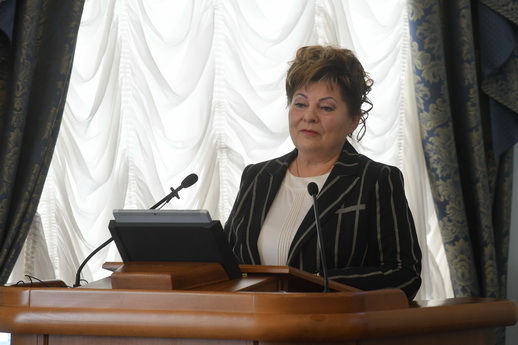
After all the issues on the agenda were considered, the deputy
Plenipotentiary Representative of the President of the Russian Federation in the Siberian Federal District Lyubov
Burda presented Vladimir Varnavsky with the Order of Alexander Nevsky. This high award
the speaker of the regional parliament was awarded for active legislative activity
and many years of conscientious work by Decree of the President of the Russian Federation No. 381 of June 15, 2022
of the year "About the award
state awards of the Russian Federation."
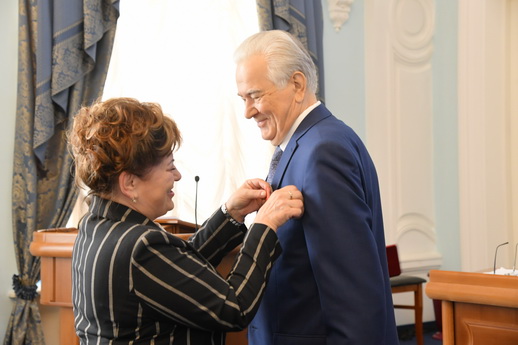
“Dear deputies, colleagues!” Lyubov Burda addressed
to those present. – I had the great honor to present the state award
Chairman of the Legislative Assembly of the Omsk Region Vladimir Varnavsky."
Noting the special contribution of the Chairman of the Assembly to the development of the Omsk region, in
formation of a single legal space in Russia, strengthening of the Russian
statehood, Lyubov Burda also expressed gratitude for the enormous
work from the plenipotentiary representative of the President of the Russian Federation in the Siberian Federal District
Anatoly Seryshev.

Speaking in response, the Chairman of the Meeting said: “First of all, I thank the President of the Russian Federation Vladimir Vladimirovich Putin for appreciating the joint work with you. I am grateful to you for your trust in me, for your support, for your constructive work for the benefit of Omsk residents and our great Russia. There is a lot of work ahead, and we We'll deal with them."
Vladimir Varnavsky also thanked Lyubov Burda for finding the time
and the opportunity “so solemnly, at a meeting, here on Omsk land,
present this award."
Concluding the meeting, Vladimir
Varnavsky summed up the work of the parliament and declared the spring session closed.



 < br>
< br>




